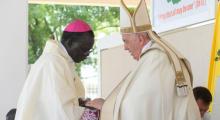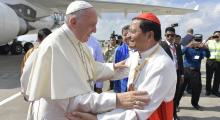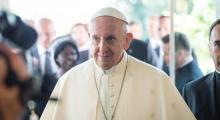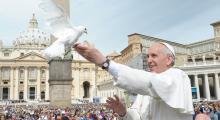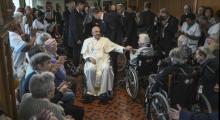Issued by the Catholic Center for Studies and Media - Jordan. Editor-in-chief Fr. Rif'at Bader - موقع أبونا abouna.org
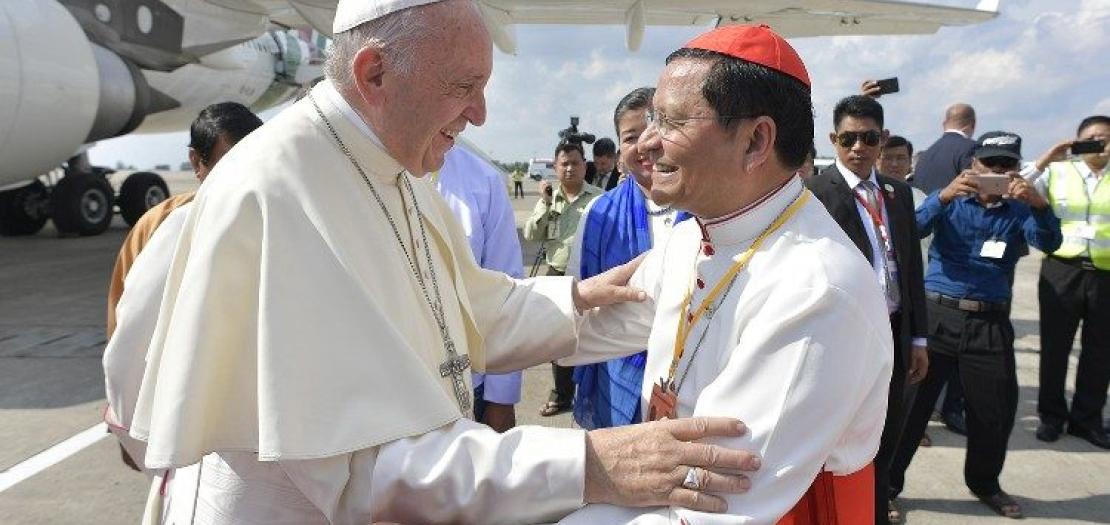
"Pope Francis related to all, with the broken, the forgotten, and the earth itself. He made room in his heart for those the world pushed aside. And so now, as the world mourns him, we feel the sorrow that always follows great love."
In a wide-ranging interview with Vatican News, Cardinal Charles Maung Bo, Archbishop of Yangon and President of Myanmar's Bishops' Conference, who served two terms as the President of the Federation of Asian Bishops' Conferences, remembered the late Pope Francis in this way following his return to the Lord on 21 April.
Cardinal Bo had the joy of being named by Pope Francis as the first-ever Cardinal of Myanmar, and of welcoming the Holy Father to his nation in November 2017.
Remembering Pope Francis' historic Apostolic Journey to his nation, the Cardinal said, "Despite significant pressure from various quarters urging him not to visit our country, and despite the many challenges that loomed large, Pope Francis chose to come. And in doing so, he shone a great light upon the suffering of our people."
In fact, the Cardinal remembers, "Pope Francis had a profound affection for the people of Asia," adding, "he fell in love with the people of Myanmar."
Over the years, the Pope has made constant appeals for Myanmar, for peace and for aid, and even before his passing, not only did he express his condolences for all those affected by the tragic quake, but he also offered sustenance to help the suffering population.
Q: Cardinal Bo, Pope Francis has constantly shown closeness to your nation’s people. What did the Pope's closeness to the people of Myanmar suffering on every front, with war, humanitarian emergency, and then compounded by the earthquake, mean to them?
Pope Francis is truly a prophet of the peripheries. He did not seek safety in the centers of power, nor did he make the comforts of the Vatican his refuge. Instead, he turned his heart and gaze toward the existential margins of humanity—to those whose cries are drowned out in the global discourse, whose tears go unnoticed by the world.
In that spirit, his attention was drawn to Myanmar—a nation long-suffering, wounded, surviving polycrisis. Despite significant pressure from various quarters urging him not to visit our country, and despite the many challenges that loomed large, Pope Francis chose to come.
And in doing so, he shone a great light upon the suffering of our people. His decision startled many—even among the Catholic nations of the world. But to him, humanity is paramount, and human suffering is a sacred concern.
He fell in love with the people of Myanmar—with their patience, their courage, and their remarkable solidarity amidst spiralling crises. As one wave of turmoil after another struck the nation, he walked with us—not from a distance, but in an emotional and affectionate solidarity. He carried our pain in his prayers, in his messages, and in his heart.
More than nine times, he publicly spoke about Myanmar. He issued heartfelt statements and even celebrated a special Mass for peace in our land. In doing so, he reminded the world that Myanmar matters, that our wounds are not invisible, and that peace is possible.
Q: Certainly, he did insist on never forgetting Myanmar...
His unwavering support and his deep and personal concern for the suffering of our people touched countless hearts across our nation. Even as nature itself turned against us and the earthquake battered us, Pope Francis did not retreat. Through the Vatican, gestures of concern and acts of compassion were sent—quiet yet powerful affirmations brought to our people that we were never forgotten by the Holy Father.
What makes this even more moving for our people is that he did all this in the twilight of his papacy, while battling a life-threatening illness. In his final days, when most would seek rest, he continued to carry the cross of the suffering world—Myanmar among them.
His memory is now etched into the soul of our nation. The people of Myanmar will never forget such a loving and compassionate shepherd. His voice became our echo, his heart beat with our grief, and his presence brought healing.
Q: In his last days, he appealed for your country, and offered support. How important has this been?
Indeed, his concern was the “balm that heals our people.” Imagine thousands of homeless individuals, churches, and church personnel forced to sleep in the streets, facing daily threats from nature and experiencing apocalyptic moments.
In such a situation, the Pope’s concern and support flow like a mother reaching out to a frightened child. Not only Catholics, but others as well, when they learned that Pope Francis prayed in Angelus for Myanmar, they were deeply consoled.
Our own Christians felt a sense of belonging to a vast human family where no one’s suffering or tears are forgotten. This feeling arose because Pope Francis was proactive in reaching out to people.
Q: What do you see as Pope Francis’ legacy?
Pope Francis will be remembered in history as one of the most remarkable disciples of Jesus—a Pope who consistently adhered to the radical core of the Gospel: God’s unwavering concern for the most vulnerable, marginalized, and lost individuals. In an era when many succumbed to the temptation to reduce faith to comfort and conformity, he possessed the courage to speak with the fervor of prophets and the tenderness of Christ.
His words, at times unsettling to the powerful and self-satisfied, served as a mirror to a world that had become desensitized to injustice. Particularly in affluent nations where Christianity is often distorted to justify privilege and exclude the poor, Pope Francis re-centered the Gospel’s original axis: Christ’s unwavering love for the impoverished and His divine solidarity with the marginalized.
He did not merely engage in discourse about the poor; he actively walked alongside them. He did not merely defend the oppressed; he embraced them as his own. His papacy embodied a living parable—a witness to a Church that must not reside in palaces while the world languishes outside its gates.
History will not only recognize his words but also the profound alignment between his life and the life of Jesus. His simplicity, humility, courage, and joyful compassion transcended any decree. In a world growing cold and infected with a culture of indifference, he reminded us that the heart of the Church must pulsate with mercy.
Pope Francis’s legacy will be that he restored the Church to the streets, to the peripheries, and to the wounded corners of the world where Christ Himself dwells. He demonstrated that to be truly Christian is to emulate Jesus’ footsteps, to advocate for those who lack a voice, and to love with the reckless generosity of the Gospel.
Q: And would you say he offered special attention to the people throughout Asia and Oceania?
Pope Francis held a profound affection for the people of Asia. During one of his final visits to the Far East, he made a pilgrimage to a remote region where the Catholic presence was virtually nonexistent.
He embraced all individuals of Asia and Oceania, embodying the role of a Good Shepherd who sought to engage with those he desired to dialogue with. While others prioritized engaging with esteemed scholars, Pope Francis championed dialogue through encounters with diverse cultures, peoples, and their respective contexts.
His recognition of indigenous communities as the guardians of nature facilitated numerous cultural exchanges. In Myanmar, his visit left an enduring impression on the populace.
The people of Asia, as Pope Francis believes, will extend a welcoming embrace to the Christ of Asia. This century holds the promise of Christ’s return to Asia, and the Asian Christ will continue to inspire the world. In his profound understanding of Asia and the Asian Church, Pope Francis envisioned a future where these two entities intertwine in a profound and transformative way.
Q: Your Eminence, are there any words of comfort or faith you would like to offer to those mourning Pope Francis' loss?
In moments of deep sorrow, when the world feels quieter and our hearts ache from loss, we must remember the sacred truth Pope Francis lived and taught: life is relationship.
His entire papacy was a symphony of relationships—rooted in love, expressed in solidarity, and lived with simplicity. His three most important writings beautifully reflect this.
The Joy of the Gospel was really his call to restore our relationship with God, full of grace and gladness. Then Fratelli Tutti gave his bold vision of fraternity and friendship with one another, beyond borders, beyond differences. And finally Laudato Si,’ Pope Francis made his passionate plea to restore our relationship with creation, caring for our common home.
Pope Francis related to all, with the broken, the forgotten, and the earth itself. He made room in his heart for those the world pushed aside. And so now, as the world mourns him, we feel the sorrow that always follows great love.
Where there is a deep relationship, there is also the deep pain of parting. Our mourning is not weakness. Rather, it is a testimony to the beauty of the connections he built across cultures, nations, and hearts.
But if we listen carefully to the silence he leaves behind, we can almost hear his whisper: "Do not remain too long in your grief—get back to what matters. Comfort the suffering. Lift the lowly. Preach peace that is rooted in justice. Be tender. Be bold. Build the world we dreamed of together."


